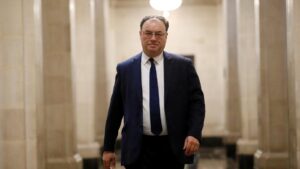
The Bank of England is expected to make its largest interest rate rise since Black Wednesday in September 1992 today as it battles to bring double-digit inflation back to its 2 per cent target.
Investors are betting that rates will rise by 0.75 percentage points from 2.25 per cent to 3 per cent.
The Bank’s nine-strong monetary policy committee, which is responsible for setting rates, will announce its decision at noon. The committee has so far delivered seven back-to-back rate rises since last December when rates were at a low of 0.1 per cent.
Karen Ward, chief strategist for JP Morgan Asset Management and one of the four members of the Treasury’s new Economic Advisory Council, said that markets were expecting the 0.75 percentage point rise and warned that a smaller rise could spark a new round of market selling. Ward is also one of the nine economists on The Times shadow MPC who all agree on the need for the big rate rise.
The Bank of England faces an unforeseen but familiar dilemma when making its latest rates decision today: the absence of official news about the state of government policy.
The Bank had expected to have a full set of independent forecasts from the Office for Budget Responsibility on the state of the economy and an updated fiscal plan from the chancellor ahead of today’s meeting. But the decision to move Jeremy Hunt’s medium term fiscal plan from October 31 to November 17 means the Monetary Policy Committee is once again flying blind.
This was also the case at the Bank’s last rate-setting meeting in September which was held on the eve of Kwasi Kwarteng’s disastrous mini-budget.
Without numbers on the chancellor’s plans for public spending and taxes, the Bank will be publishing its latest set of growth and inflation forecasts today based on currently announced government policy. This includes measures like the cut in National Insurance announced by Kwarteng but won’t factor in a fiscal tightening worth around £50 billion expected in two weeks. It means the Bank’s outlook for the economy should be taken with a heavy dose of salt. Everything is subject to change.
The Bank of England’s interest rate decision this afternoon comes after the US Federal Reserve unleashed its fourth consecutive jumbo interest rate rise last night.
The world’s most powerful central bank began raising interest rates by 75 basis points in June — an example that investors think the Bank’s monetary policy committee will follow today. Should it happen, it would be the Bank of England’s largest single monetary tightening since the Black Wednesday crisis 30 years ago.
The Fed’s aggressive moves have far-reaching consequences for the UK and the global economy. Rapid US interest rate rises have pushed the dollar to its strongest in over 20 years, forcing down the value of the pound. Higher US borrowing costs also raise the cost of credit for many governments by forcing up global bond yields.
US interest rates are now at 3.75-4 percent, the highest since early 2008 and up from close to zero at the start of the year.
Read more:
Bank of England expected to deliver biggest interest rate rise in 30 years





